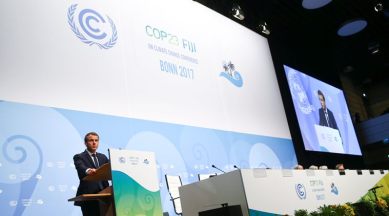Stay updated with the latest - Click here to follow us on Instagram
On last day, climate change meet moves into extra time
Termed ‘Facilitative Dialogue’, this meeting is supposed to assess whether the climate actions promised by all the countries under the Paris Agreement were commensurate with the overall objective of keeping temperature rise within 2 degree celsius compared to pre-industrial times.

True to its character, the year-ending annual climate change conference moved into extra time on Friday evening, unable to come to a timely agreement over relatively trivial and procedural issues about what exactly should or should not be discussed at meetings scheduled for next year.
The two-week conference was supposed to end on Friday evening, but till late at night negotiators were huddled in meetings trying to forge an agreement over the ‘design’ of a stock-taking meeting that the Paris Agreement had said should happen in 2018. Termed ‘Facilitative Dialogue’, this meeting is supposed to assess whether the climate actions promised by all the countries under the Paris Agreement were commensurate with the overall objective of keeping temperature rise within 2 degree celsius compared to pre-industrial times.
monthly limit of free stories.
with an Express account.
Additionally, this meeting is also supposed to examine what further actions needed to be taken to restrict temperature rise to 1.5 degrees. The assessment will be helped by a special report on 1.5 degree scenarios from the Inter-governmental Panel on Climate Change (IPCC), the body of scientists whose reports have formed the foundations on which international climate negotiations have been going on since the early 1990s.
One of the tasks before the negotiators here in Bonn was to finalise the ‘design’, or the agenda, for this meeting which will be held alongside the annual climate conference, scheduled in Poland next year. Fiji, which is presiding over the Bonn conference, has proposed that this meeting should be held in the spirit of Talanoa, an ancient form of conversation in the Pacific islands, where people try to resolve their difference without putting blame on each other. The proposal has been accepted and the meeting is now referred to as Talanoa Dialogue.
There were some differences over the actual agenda of the Talanoa Dialogue, especially over whether obligations of the mainly the developed countries in the pre-2020 period should also be a part of that. It was agreed that it would be part of the discussions, even though a separate stock-taking exercise, exclusively on ‘pre-2020 actions’ of developed countries, have also been agreed upon at the insistence of developing countries.
On the last day of the negotiations here, the developing countries noticed that the proposed agenda for the Talanoa Dialogue did not have reference to transfer of finance and technology, an integral part of the ‘pre-2020’ obligations of the developed countries, and insisted that it be included as well.
This and other similar procedural issues, like the format in which developed countries should report their progress on providing finance under the provisions of the Paris Agreement, ensured that the conference was unable to finish on time yet another year.
The two-week climate change conference has invariably stretched into an extra day on every occasion since 2009. In 2011 in Durban and 2014 in Lima, the negotiations had gone on till the morning of Sunday.